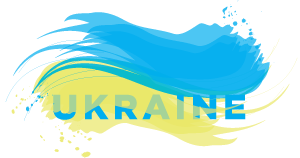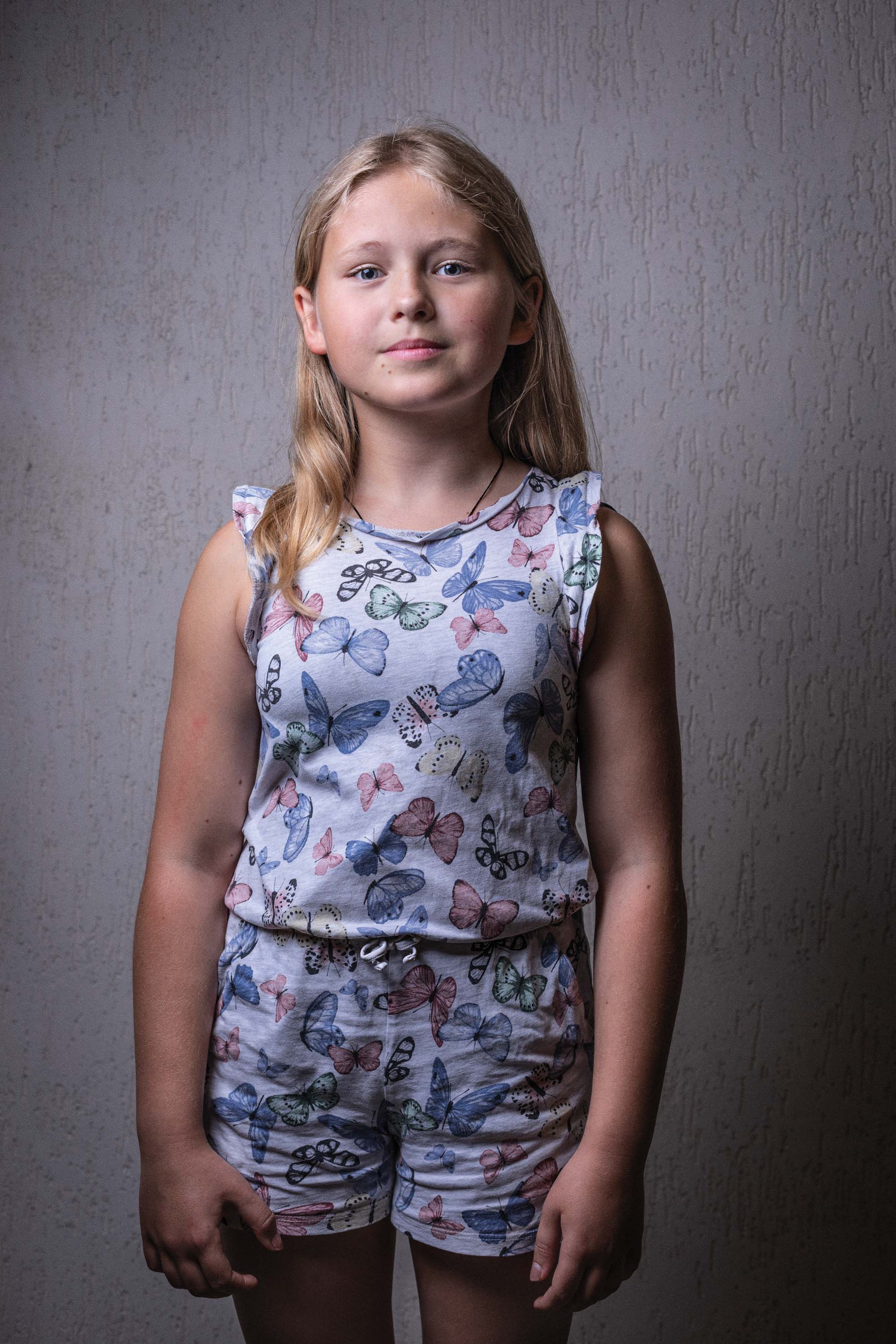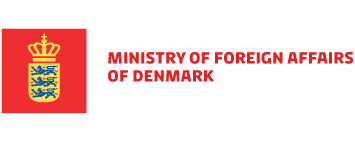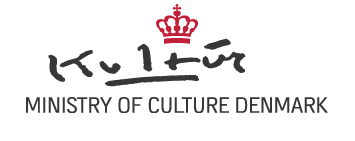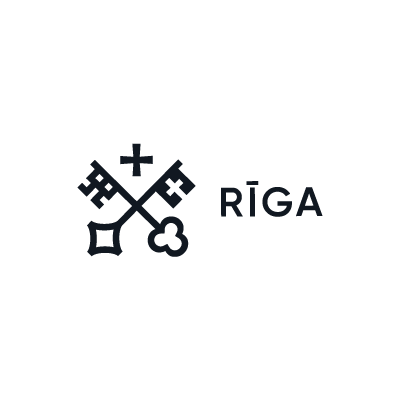Masha clearly remembers the day when everything changed. The morning when her mother woke her up earlier than usual, and she had to get ready right away. “There is war in Ukraine. Bombs are falling from the sky,” her mom said. Still, Masha thought she would go to school. Maybe it was safer there. She started to think about the dance class at noon. That would be canceled too? Masha’s father came, and they rushed off to seek shelter in the basement of her friend Polina. Masha, her mother as well as Polina and her mother were about to become internally displaced.
Internally displaced
Soon after, the four of them moved to a village in an attempt to find a safer hideout. Masha recalls the scary events that took place when going to the village. When she saw war with her own eyes. “At first I thought it was fireworks. But rockets were flying around, there were a lot of helicopters, and we saw and heard a lot of explosions. I would lay down on the floor. Polina didn’t seem to care.”
Masha
We saw and heard a lot of explosions. I would lay down on the floor. Polina didn’t seem to care.
Masha and Polina ended up staying in the village for two months until her father and the Ukrainian army insisted it was time to leave. After 3 days back home in Kyiv, they finally made the decision to leave Ukraine. Through Poland, Masha and her mother reached Riga in the early summer.
Staying in Riga
Masha lives in one of the temporary camps around Riga. She has made new friends, but still it isn’t the same feeling as with her friends at home. At the same time, Masha carries a constant fear of losing her father and her grandparents in the war. Communication is bad, and they rarely talk. When we met Masha on a warm summer day, she sat on a small wooden chair in front of us. Talking about her dad, one could sense she was about to cry. “I hope the war will end soon, so I can see my father and grandparents. I miss them a lot,” she says in a sad tone.
After the summer holidays, Masha started in a local school teaching both in Latvian and Russian.
About Brothers & Sisters
A photo exhibition in response to the war in Ukraine
On 24 February 2022 Russia invaded Ukraine. Since then millions of people have fled the war. The conflict is becoming increasingly deadly and as of August 2022, 6,6 million Ukrainians have already left the country. Many more have been internally displaced. Mainly women with children and elderly are leaving Ukraine while men between the ages of 18 and 60 have to stay to defend their country.
The war has consequences well beyond Ukraine and has a negative effect on European and global society at large. Latvia and other countries in the region have opened their borders to receive refugees from the conflict with at present 36,500+ Ukrainians registered in Latvia.
This exhibition tells the stories of some of the people who have made the journey from Ukraine to Europe. The idea is to offer a space for you to meet our fleeing ‘brothers and sisters’ and listen to their experiences. To create opportunities for reflection and positive dialogue. And to inspire feelings of solidarity and empathy.
In times of war and crisis, the human experience is often reduced to numbers and statistics; it is difficult to conceptualise the idea of more than 6 million people fleeing their homes and families.
Brothers & Sisters strives to show each human as an individual person with a name, a face and a story.
selection of stories
Portraits & stories by Martin Thaulow
Translations & Coordination Danish Cultural Institute in Estonia, Latvia and Lithuania
Embassy of Denmark, Latvia
Partner
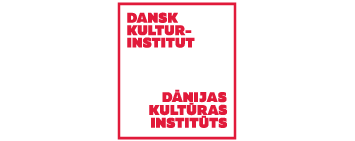
Backed by
Exhibition locations
Brāļi un māsas
Maša
Tēti, es Tevi mīlu. Es ilgojos pēc Tevis. Es ceru Tevi drīz satikt…
Maša ļoti skaidri atceras dienu, kad viss sākās. Tajā rītā mamma pamodināja Mašu agrāk kā ierasts, un viņai nekavējoties bija jābūt gatavai doties. “Ukrainā ir karš. Bumbas krīt no debesīm,” mamma teica. Maša tomēr domāja, ka viņa varētu doties uz skolu. Varbūt tur būtu drošāk. Viņa sāka domāt par deju nodarbību, kas bija paredzēta tajā pēcpusdienā. Vai tas nozīmēja, ka arī tā tiks atcelta? Ieradās Mašas tētis, un viņi kopā devās meklēt patvērumu Mašas draudzenes Poļinas mājas pagrabā. Mašai, viņas mammai, kā arī Poļinai ar savu mammu drīz nāksies meklēt patvērumu citur.
Iekšēji pārvietotas
Drīz vien viņas visas četras pārcēlās uz ciematu, cerot, ka tas būs drošāks patvērums. Maša atceras baisos notikumus pa ceļam uz ciematu: “Sākumā es domāju, ka tas ir salūts. Bet tās bija raķetes, kas lidoja visapkārt, bija arī daudz helikopteru, mēs redzējām un dzirdējām daudzus sprādzienus. Es parasti gūlos uz zemes. Poļinai gan tas daudz nerūpēja.”
Maša
Mēs redzējām un dzirdējām daudzus sprādzienus. Es parasti gūlos uz zemes. Poļinai gan tas daudz nerūpēja.
Maša un Poļina palika ciematā vēl 2 mēnešus, līdz viņas tēvs un Ukrainas armija uzstāja, ka palikt nav droši un viņām ir jādodas prom. Atgriežoties mājās Kijivā, pēc 3 dienām viņas pieņēma lēmumu pamest Ukrainu. Maša un viņas māte sasniedza Rīgu caur Poliju vasaras sākumā.
Dzīve Rīgā
Maša dzīvo vienā no pagaidu kopmītnēm Rīgā. Šeit viņa ir ieguvusi jaunus draugus, bet tomēr sajūtas nav tās pašas, kā ar draugiem savās mājās. Tajā pašā laikā Maša ir nepārtraukti satraukta, ka varētu zaudēt karā savu tēti un vectēvu. Sakari ir slikti un viņi sarunājas reti. Kad mēs viņu satikām siltā vasaras dienā, viņa sēdēja mūsu priekšā uz maza koka krēsla. Ir skaidri nojaušams, ka, runājot par savu tēti, viņai gribas raudāt. “Es ceru, ka karš drīz beigsies un es varēšu satikt savu tētiu un vectēvu. Es pēc viņiem ļoti ilgojos,“ viņa skumīgi nosaka.
Pēc vasaras brīvdienām Maša ies vietējā skolā, kurā mācīsies gan latviešu, gan krievu valodā.
Par izstādi BRĀĻI UN MĀSAS
Foto izstāde reaģējot uz karu Ukrainā
2022. gada 24.februārī Krievija iebruka Ukrainā. Kopš šīs dienas miljoniem cilvēku ir bēguši no kara. Aizvien vairāk dzīvību tiek zaudētas konflikta rezultātā, un līdz 2022.gada augustam 6,6 miljoni ukraiņu ir pametuši savu valsti. Vēl vairāk ir pārvietojušies valsts iekšienē. Lielākoties sievietes ar bērniem un vecāka gada gājuma cilvēki pamet Ukrainu, kamēr vīrieši vecumā starp 18 un 60 paliek, lai aizstāvētu savu valsti.
Karš atstāj sekas daudz tālāk par Ukrainas robežām un tam ir negatīvas sekas gan uz Eiropas, gan uz visas pasaules sabiedrību. Latvija, tāpat kā daudzas citas valstis, ir atvērusi savas robežas, lai uzņemtu Ukrainas kara bēgļus, un šobrīd Latvijā ir vairāk nekā 36 500 ukraiņu, kas meklē šeit patvērumu.
Izstāde atklāj to dažu cilvēku stāstus, kuri ir mērojuši ceļu no Ukrainas uz Eiropu. Mūsu ideja ir piedāvāt telpu, kurā var satikt mūsu bēgošos “brāļus un māsas” un sadzirdēt viņu pieredzes. Radīt iespēju pārdomām un pozitīvam dialogam. Kā arī iedvesmot solidaritātes un empātijas jūtas.
Kara un krīzes laikos cilvēku pieredzes bieži vien tiek pārvērstas skaitļos un statistikās. Ir ārkārtīgi sarežģīti aptvert domu, ka vairāk nekā 6 miljoni cilvēku bēg prom no savām mājām un pamet ģimenes.“Brāļi un māsas” cenšas parādīt katru cilvēku kā individuālu personību ar vārdu, seju un savu stāstu.
Portretu un stāstu autors Martin Thaulow
Tulkojums Dānijas Kultūras institūts un Dānijas vēstniecība Latvijā
Sadarbības partneris

